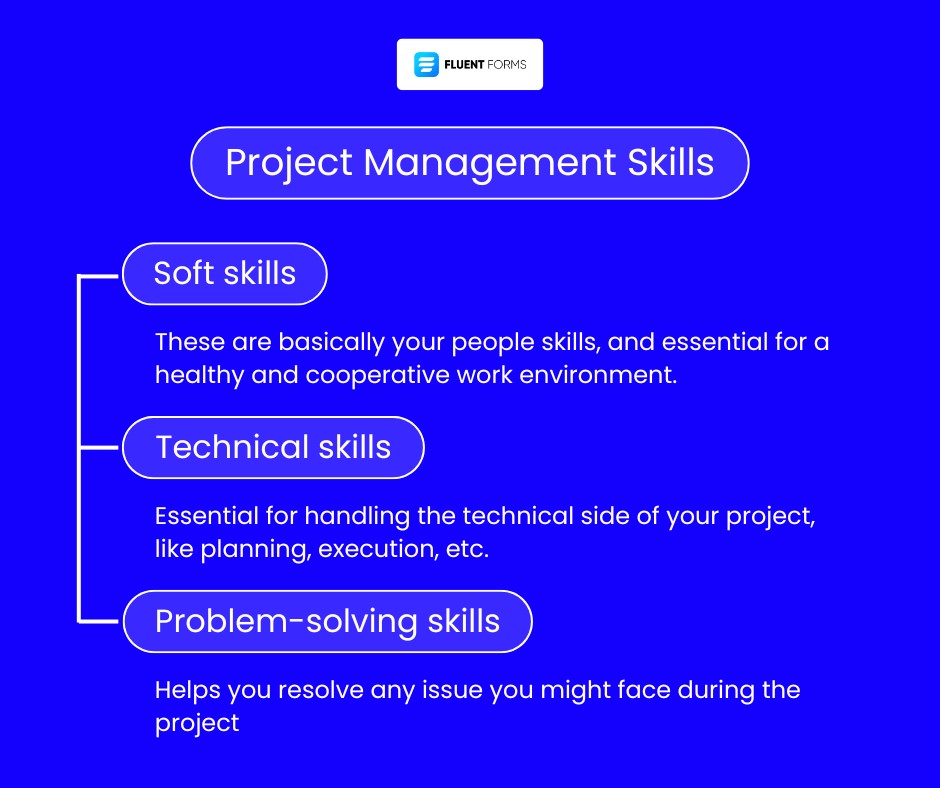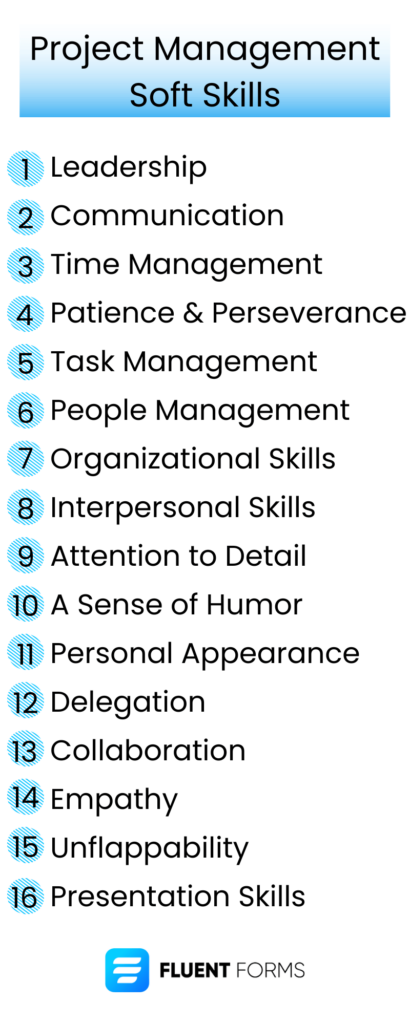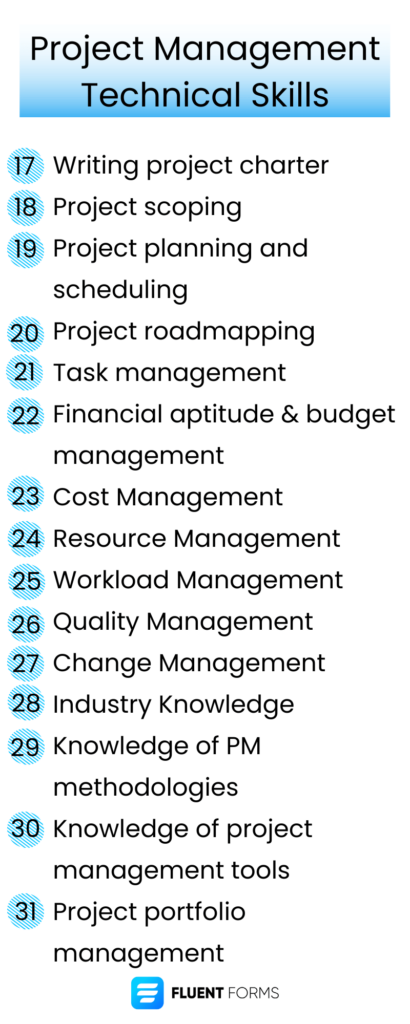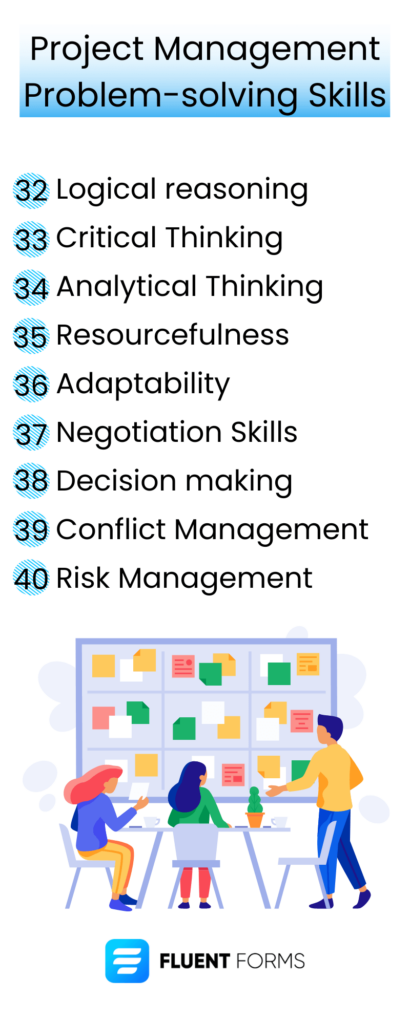40 Essential Project Management Skills for Small Business Owners

You started your business recently. Everything is new; renting office spaces, hiring team members, and you’re very excited about everything. You even have all your projects mapped out in your head, and you go to your friend, the CEO at EasyByte IT, for some last-minute insights.
Your friend tries to help you; however, you find it overwhelming since he brings up his experience over and over again. Now you’re questioning if your research, knowledge, and skills will be enough to build your future empire. The answer is YES.
Here we’ve listed all the project management skills essential for running all your business projects. Have a look at these, and cross-check with your strong points. Over time, you can work on the skills you think you need to improve. It’s that simple; practice these 40 skills and watch your business thrive in no time.
40 essential project management skills for small business owners
Project management skills are a must-have for every business owner. Because, first, every business has to run projects on different scales depending on the size of the start-up or company. Even if you have a project manager on your payroll, you need project management skills to oversee your projects.
However, if you have never managed a project before and are not sure about which skillset you need, we’ve got you covered. Don’t let the number of skills overwhelm you, because the skills are all connected. If you’re mastering one, you’re certainly getting good at the others as well.

Soft skills
Soft skills are just as important for project management as they are in regular personal and professional life. These are a set of social skills and emotional intelligence required for a person’s adaptation to different situations and ability to conduct their work successfully. These skills are also necessary for idea generation and innovation. The soft skills a project manager needs to possess include the following:

1. Leadership
Leadership skills are crucial if you want productivity from your team. You need accountability from them and to show compassion at the same time. A good leader knows how to balance the two. As a product manager, you’ll need to be decisive sometimes, and sometimes you’ll have to leave things to your team members. Your leadership qualities will help you determine when to take which course.
Moreover, when your employees and team members see you as a leader, they’re more comfortable going to you with their queries and discussing ideas.
2. Communication
Communication is another key skill for project management. There are different dimensions in a project, and everyone has their job sorted out. It’s the project manager’s job to communicate with each of the members to keep track of progress, any potential issues, timeliness, etc.
Communication is also important to know about the employees. If you can communicate effectively, you’ll know the expertise of each of your employees and be able to utilize it. On the other hand, if you’re good at communication, the employees will be comfortable talking to you about their problems and inconveniences. Solving those problems helps your projects even more.
Another upside of being good at communication is that you’ll be great at convincing the stakeholders about the goals and different stages of the project. This way, they won’t have any unrealistic expectations.
3. Time management
Time management is another primary skill for a project manager. If a project manager is not good at time management, the project gets delayed. If a project is dragged on longer than necessary, it takes up more resources than planned. On top of that, clients are not happy with the service if the project is not delivered on time, which brings a bad reputation for the business.
To be great at time management, try setting deadlines for small tasks and completing them on time. Give your team members deadlines and ask them to deliver on time. Raise accountability and supervise closely.
4. Patience & perseverance
Patience and perseverance are very important for the successful delivery of a project. When the project starts, a lot of things can go wrong or not according to plan. Situations like those can be frustrating. However, patience and perseverance help you start over without getting demoralized. It also helps you not lose your temper with your employees, which is crucial for a healthy work environment.
5. Creativity
A problem can have multiple solutions, but you have to think of an ingenious solution unthought of by others. That’s what makes your business stand apart from all the others in your niche. And how do you achieve that? Well, by thinking outside the box and using your innovativeness.
6. Organizational skills
Organizational skills are a basic requirement for project management. With notable organizational skills, you never lose track of time. Your work distribution is impeccable, and the project moves smoothly. Besides, organizational skills also help optimal use of resources. Additionally, if you need to revisit old data, good organizational skills really help you go through them efficiently.
7. Interpersonal skills
Interpersonal skills are mandatory for the successful completion of a project. Especially if you’re a team of more than one, you need to deal with everyone as a project manager. All of your team members won’t have the same personality. And you’ll need to know how to reach and motivate every individual. Sometimes you might even have to resolve disputes between other team members, and great interpersonal skills will help you there.
To improve your interpersonal skills, you should look at everything with a positive attitude. Besides, removing biases and thinking from others’ perspectives also goes a long way toward securing your interpersonal skills.
“People work better when they know what the goal is and why. It is important that people look forward to coming to work in the morning and enjoy working.” – Elon Musk
8. Attention to detail
Attention to detail is the key to ensuring the quality of your project. You should ensure that your team members are doing their job thoroughly. Because the more perfectly a task is done, the less the chances are of it going wrong. As a result, you won’t have to repeat a task, which will ensure the timely completion of a task, as well as its quality.
9. Personal appearance
Personal appearance might seem irrelevant, but it’s actually important for a number of reasons. First, your self-assurance brings about confidence among your employees as well. They’re inspired and excited to work with you.
Besides, your composure will help you convince stakeholders and investors easily, which is really important for bringing everyone on the same page.
10. Delegation
Delegation refers to your ability to assign tasks to team members and offer them the necessary direction for completing them. When the work is delegated effectively, it increases the success rate of a project. If you’re not good at delegation, you’ll end up doing everything on your own despite having team members for each task.
Besides, proper delegation helps you with accountability. You’ll be aware of the project’s progress at all times from your team members’ reports on their tasks.
11. Collaboration
Collaboration is crucial for the efficient completion of a project. All the tasks of a project are connected, and often tasks have dependencies. However, since tasks are distributed among the team members, they must collaborate and help each other. That way the tasks move way faster than they would’ve without collaboration.
As a project manager, you need to create an environment of collaboration. You have to inspire your team members to help each other. They’ll practice it more easily once they learn that you’re helpful and cooperative.
12. Networking
Networking is not just important for your project, it helps your business immensely as well. You need different vendors, clients, and customers. Networking helps spread the word-of-mouth for your business. Reputed vendors and clients are interested in doing business with you. Also, with effective networking, you can bring skilled members to your team. All these ensure the quality of your project.
13. Empathy
Empathy takes you a long way with your team members and employees. If you show them empathy, they’re more comfortable coming to you with their problems. On the other hand, they’re more understanding of your situation as well. This helps develop mutual respect, which is a must for a healthy work atmosphere.
14. Self-control
Unflappibility or the ability to stay calm in a crisis is another noteworthy skill you should have as a project manager. You need to always act in a professional capacity even if things go wrong. Besides, if you can’t stay calm under pressure or when things go wrong, it’ll also demotivate your employees. The project might even fall apart when it can easily be avoided if everyone stays calm and discuss possible solutions.
15. Presentation skills
Your presentation skills are a massive factor when it comes to bringing the stakeholders and investors on board. With a great presentation, that satisfies everyone’s questions, you can motivate your team way easily. Also, the better you can explain, the better versed your teammates are about what is expected of them, and what their responsibilities are.
A good presentation makes your job as a project manager a lot easier and brings everyone on the same page. For everyone to be on the same page is really important to take the project in a certain direction.
16. A sense of humor
A sense of humor is a great soft skill for a project manager. Because, well, the mood of your work environment depends on your mood. If you’re jolly and having fun, your team members are also comfortable having fun with you and among themselves.
Besides, a workplace that’s always serious is monotonous to work in. This ultimately lowers productivity instead of increasing it. However, you also have to keep in mind that your sense of humor must not be offensive to someone else.
Technical skills
Project management technical skills or hard skills cover the range of skills required to handle the technical side of a project. It might include preparing a project outline, arranging resources, keeping track of resources, etc.

17. Writing project charter
A project charter is a document outlining the project’s goals, objectives, scope, team role, investors’ involvement, estimated return on investment, authority, etc. The project charter works as a sales pitch for the project. It’s usually used to determine whether it’s wise to move on with the project, the investors also study the project charter to make up their minds about investing in the project.
Therefore, you need the project charter to be convincing enough if you want your project to come to light. You can write it yourself, or if you have dedicated members for this purpose, you need to make sure they’re doing it right.
18. Project scoping
A project scope is the total amount of all the work needed to be done to complete a project. Project scoping determines the resources and skills needed to complete a project. An idea about the budget and a timeline can also be estimated from the project scoping. A project is planned within its scope, therefore it’s a required skill for a project manager.
19. Project planning and scheduling
Project planning and scheduling are the most important steps of a project. After the outline of a project is set, the project is planned in detail. The project work is divided into tasks and subtasks. Team members and deadlines are assigned to each task. Resources are allocated for separate tasks as well.
At this stage, task dependencies are found, and that provides the team with the precise amount of time and resources to complete each task and collaborate among themselves. An efficient plan is the key to the successful execution of a project. Therefore, as a project manager, you need to have in-depth knowledge about how to plan a project in detail.
However, planning is mostly theoretical. It’s done before the actual work starts. In the execution stage, you might find many aspects of your project deviating from the plan. This is very usual, especially if you’re just starting out. Even so, the plan is important, because it gives you a rough idea of what is to be done. It further proves helpful if you want to measure that deviation to plan more carefully for your next projects.
“Those who plan do better than those who do not plan even though they rarely stick to their plan.” – Winston Churchill
20. Project road-mapping
The project roadmap maps out project tasks, milestones, and deliverables of a project on a timeline. If you can create the project roadmap effectively, it gives your team members a sense of accomplishment after they cross each milestone and get a deliverable for it. This way, they learn that they’re on the right track and advancing toward a successful completion of the project. It keeps up their confidence and lets them know that they’re on the right track. As an effective project manager, it’s your job to offer them this assistance.
21. Task management
The work of a project consists of lots of small tasks. Most of these tasks depend on other tasks within the project. That means the dependent tasks can’t be completed till the task that they depend on gets done. Thus, if one task isn’t completed on time, it can mess with all the tasks on a chain that depend on it. As a result, the whole project gets delayed.
Since you’re the project manager, it’s your job to make sure that that doesn’t happen. This is where your task-management skills come in handy. You take regular updates on all the running tasks and see that there are no obstacles in the way of their timely completion.
22. Financial aptitude and budget management
As a project manager, you require an acute sense and understanding of financial matters. The better your financial aptitude is, the more cost-effective your project is. Since your profit directly depends on your costs, you need to be able to manage your budget efficiently.
To plan your budget, you should do thorough research on the market. Study the vendors, and settle for the ones where you’re getting proper value for your money.
23. Cost management
Even after careful planning of the budget, the costs of a project might not always stay within it. There’s no need to worry; it happens to everyone. First, you need to know the status of your costs.
If you don’t know how to manage your costs efficiently, you can start by keeping tabs on all your financial transactions and monitoring all your costs closely. Furthermore, you can compare the actual costs and the planned costs of the tasks. If your actual costs exceed your budget, you can discuss with your team members how to minimize the costs and apply new tactics.
24. Resource management
Resources directly affect your project deadline. If you have enough resources, it’s easier to finish the project early. But with fewer resources, it takes longer to finish with the same resources.
Resources can mean both material resources like machinery and humans like your employees. Usually, resource leveling and resource smoothing are applied for resource management. Which basically means, you can start with fewer resources at the beginning.
After work begins to progress, you settle on a deadline and smooth out your resources to finish the project on time. You can evenly distribute the work hours, utilize your team’s expertise properly, or hire freelancers at this stage so the project is finished within its timeline.
25. Workload management
Another skill in project management is workload management. For example, it’s your responsibility to ensure that none of your team members are assigned to two different projects at the same time. That tires them out, which is not good for any of those projects. Similarly, you have to keep in mind that you can’t overwork any of your employees because that’ll keep them distracted.
26. Quality management
You cannot compromise the quality of your project. Make sure you’re getting the best value for your money. Quality is the ultimate thing you should look for in your deliverables. This is what your project will be judged upon, and your reputation depends on the quality of the project you deliver.
You need to personally assess the quality of each deliverable, look for areas to improve quality, and implement those. Paying attention to the details will make this easier for you.
27. Change management
Change is unavoidable halfway through a project. It can happen for many reasons: the clients may change their minds, a particular resource might be unavailable, and you may have to find a workaround. As a project manager, you have to make sure that the change is incorporated successfully into the project and that the project is running in full swing.
Your change management skills include helping team members adapt to change and managing the stakeholders’ resistance to the changed plans. Change management skills are extremely important if you don’t want to hinder the progress of your project.
28. Industry knowledge
If you say your job is project management, and therefore you only need to know how to plan and manage a project, you’d be right. Of course, you’ll have industry experts in your projects for different purposes. However, if you have industry knowledge to a necessary extent, you’ll understand the project better and what direction it’s going. You’ll also have an idea about what the experts are doing, which is very important if you want to ensure a successful delivery.
All you need to enhance this skill is to study and research relevant data, be it tech, agriculture, real estate, or anything for that matter.
29. Knowledge of project management methodologies
Different projects require different types of management. If your client is sure about what they want and has a tight schedule, you need one type of project management. If your client is unsure about what they want, and there might be changes along the way, you need a project management technique to accommodate their wishes.
Besides, there are project management methods that focus on staying under budget, managing risks, measurable deliverables, etc. Depending on your or your client’s requirements, you can choose one or a combination of project management methods, including the waterfall method, lean management, agile project management, scrum, Six Sigma, critical path method, risk management, change management, etc.
To manage any project with efficiency, you need to be well-versed in all of these methods to find and incorporate the perfect combination of techniques for any project.
30. Knowledge of project management tools
Project management tools come with infinite functionalities. They basically take care of keeping track of every element in a project for you. The tools also come with many templates. Besides, the tools allow you to have a record of all your work in one place. You can view your data and tasks in kanban boards, calendars, galleries, etc. Besides, there are advanced functionalities like integrations. Integrations allow you to import your emails, databases, your website’s contact form entries, etc to your project management tool.
Moreover, some project management tools also offer AI features that allow automation to take care of your repetitive tasks for you. AI features also help you with brainstorming, writing, identifying key points from meeting notes, even predicting risks, etc.
The knowledge of a few project management tools helps you identify the right fit for your projects. This ultimately lets you focus on more important aspects of your project by saving you time and energy.
Pro tip: If your choice of project management tool is Notion or Trello, use Fluent Forms, the most beginner-friendly form builder plugin to import your client’s information to your project management portfolio without the help of any third parties. It happens automatically and saves you from wasting time and making mistakes.
31. Project portfolio management
Project portfolio management is the centralized management of all the projects of an organization. Managing a project portfolio is important for comparing project efficiency upon completion, keeping track of shared resources, reflecting on old projects, etc.
Besides, there may be ideas for more than one project, but the budget might allow only one. A project portfolio helps select the right project in that scenario and also keeps a record of the additional ideas.
Having project portfolio management helps your business in the long run. This is especially true for a business with a lot of internal projects.
Problem-solving skills
Once the project starts running, many issues may arise from time to time. Everything might not go according to plan. Mitigating those issues is what makes your project a success. And you need problem-solving skills for that. While your technical skills help you plan the project, your problem-solving skills are crucial for the successful execution of the project.

32. Logical reasoning
Logical reasoning is considering a solution step by step to reach a solution. Different logical reasoning could be inductive and deductive reasoning, abstract reasoning, etc. Inductive reasoning allows the development of ideas and theories, whereas deductive reasoning allows conclusions to be true and factual. Abductive reasoning, on the other hand, allows you to draw conclusions from an incomplete scenario.
33. Critical thinking
You not only have to think outside the box but think 10 steps outside the box. For any solution you can think of, you have to think about what will happen next as a result. Carefully considering the consequences of your decision is your job, and you have to be prepared for anything to come if you want your project to be successful.
34. Analytical thinking
Sometimes you might have to weigh among different options. That’s where your analytical thinking comes in. You need to take into account all the parameters that a particular decision should depend on and land on the solution that serves your project best.
35. Resourcefulness
You need to be resourceful if you want to be effective at project management. Your vendor can stop supplies at any time, or one of your team members might leave. And to rectify the situation immediately, you need to be extremely resourceful. Thus, you can find instant solutions to any issue that might come your way.
36. Adaptability
You need to be able to adapt to any situation. There might be an issue you haven’t thought about. But getting demoralized hampers your project. What you need is to change tactics, adapt to that new situation, and encourage your team to do the same as well. Once you adapt to new ways and methods, you can run the project in full swing again.
37. Negotiation skills
Negotiation skills have no alternative when you’re a project manager. You’ll often have to negotiate about funds, prices, angles to look at an issue, time, client’s expectations, etc. If you are realistic and want to deliver the objectives of a project efficiently, you need to negotiate a lot to bring everyone on the same page.
38. Decision-making
To make a decision, you have to know how to gather and analyze information, consider multiple perspectives, and weigh the pros and cons of each probable option to ultimately choose the solution that works best for your project. Your logical and analytical reasoning ability helps you make the right decision.
39. Conflict management
There can be many conflicts during the period of a project. For example, there can be conflicts about project vision, agreements, value conflicts, comprehension conflicts, clarity in roles, collaboration, etc. There can also be conflict among the stakeholders or even about leadership.
As a project manager, you should try to ensure that these conflicts don’t arise. Even if they do, you need to resolve every interpersonal and objective conflict skillfully if you want to move on with the project.
40. Risk management
You should continuously evaluate the project data to look for any possible issues coming your way. This way, you can take care of roadblocks beforehand. Besides, you can always have a contingency plan in place in case anything goes wrong. This way, you’ll always be efficient at mitigating risks.
Tips on how to improve project management skills
Your project is like a plant, you nurture it, invest in it, and eventually it flourishes. You need dedication for this. Continuously work on improving your skills, study, observe, and self-evaluate to make yourself a better project manager. Here are some tips to improve your project management skills.
Set realistic expectations
First things first. You can never succeed if you set unrealistic goals for your project. Therefore, think logically and take all the factors and parameters into account while setting the goals and objectives of your projects.
Avoid distractions
You cannot allow distractions to ruin your project. Work reasonable hours, and don’t overwork. Make sure your team members are working optimal hours as well. Additionally, don’t work on more than one project at the same time; that’s physically and emotionally draining and hampers your efficiency.
Practice time blocking
Time blocking in your scheduling improves your productivity significantly. Create some time blocks and schedule your plans accordingly. You can decide to work for 25 minutes straight before taking a short break. You can also fill your time blocks according to your preference. For example, you can reserve the mornings for creative work, leaving the afternoon and evenings for learning and meetings, respectively.
Take notes on everything
If you want to be a project manager, you have to learn to take notes on everything. Records are really important if you want to look back and reflect on any task or strategy. An organized record proves unparalleled in this scenario. This is also important for comparing different deliverables and task statuses.
Mitigate risks before they occur
An extraordinary project manager should be able to identify any risks that might appear. And once a possible risk is tracked down, you don’t wait for it to actually occur. You mitigate it before it gets a chance to show up and hamper your project. Critical thinking and research help you predict risk factors for any decision you’re about to make. Some project management AI tools also prove helpful in this matter.
Avoid multitasking
Multitasking prevents you from focusing on any task. Unless you’re a seasoned project manager who knows what he’s doing or it is very important to do multiple things simultaneously, you better stick with one task at a time.
Test as you go
Evaluate the tasks and projects you’re completing. Compare the deliverables. Measure your time for different tasks. Measure your employee satisfaction rate. Compare the planned and actual budget and time required to complete a task. Look for rooms to improve.
Identify strengths and weaknesses
You need to be able to self-evaluate and identify your strengths and weaknesses. Use your strengths to your advantage, and try to improve your weaknesses.
Emphasize accountability
If you want your team members to do their job, you should emphasize accountability. You and your team members need to be accountable for your responsibilities. If anyone messes things up or is lagging behind, they need to be able to fix it or catch up to speed. You need to practice and encourage this so there is no work piling up.
Address problems early
If you can sense that there might be a problem with a certain task, you should address it right away. Try to solve it right then, or think of solutions to apply if the problem surfaces. Delayed measures always take a toll on your investment and efforts.
Ask for feedback
Even though you’re the project manager, you can make mistakes as much as anyone else can. That’s why you sometimes need to ask for feedback on your own performance. And undoubtedly, you should go to your team members for this purpose because they’re the ones to watch you work closely. A mutual feedback exchange also increases trust and respect within the team.
Boost morale
Try to encourage your team members. You can also practice positive reinforcement. You’re their leader, and they look up to you. Positive words from you inspire them to work confidently and with fun. This is important for a healthy work environment, which is inevitable for the success of a project.
Read and research
You need to read and research a lot in your free time. The more you research, the more you know. And knowledge won’t fail you. Besides, if you keep reading, maybe you’ll find the solution to your current problem somewhere in those resources.
Training programs
There are different certification courses and training programs that you can join to improve your project management skills. You can look for them online, research and contrast different programs, and choose the one that best covers your niche and the size of your business. Make sure the training programs are scalable so your efforts are still in use once your company grows in size and functions.
Moving forward
No project manager becomes successful without making a mistake or two. It’s important that, as a leader, you learn from your mistakes. Take notes, and make sure you never repeat them. Learn about the project management skills here, and try to improve the ones you think you’re lacking. These skills will guide you through any obstacle you face along the way. Moreover, your start-up can also benefit from the project management tips and strategies planned for scalable small businesses.
Don’t hesitate to ask us if you have any questions. And let us know how these project management skills help your business and how you deal with crises.








Leave a Reply
You must be logged in to post a comment.